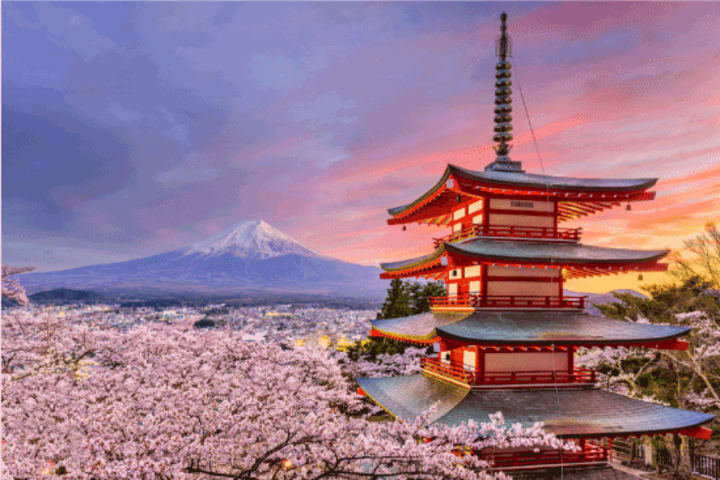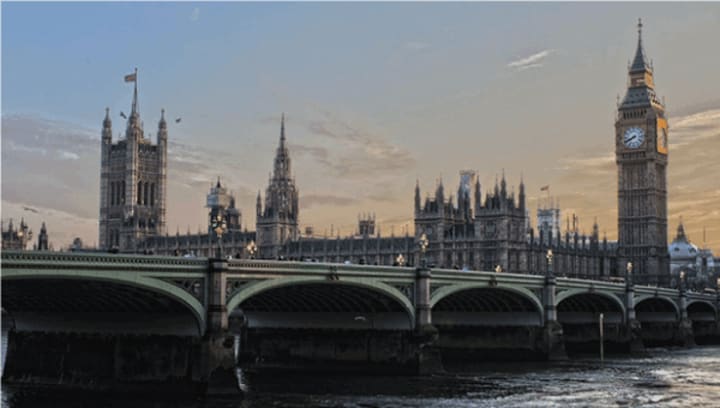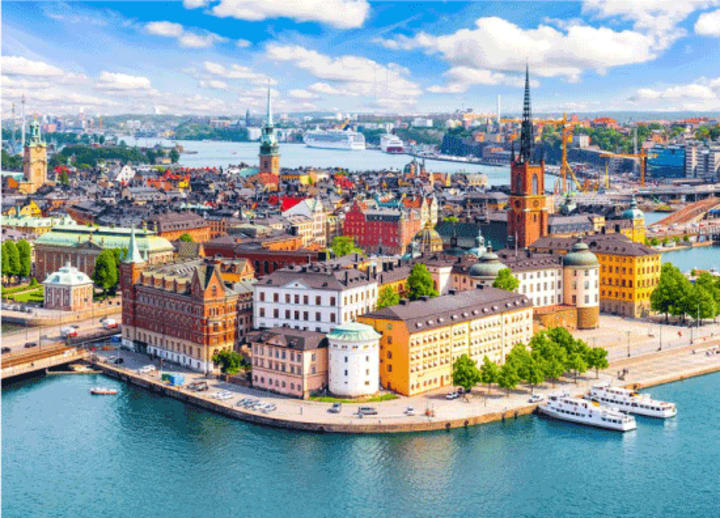Top 10 Countries in the World
The Best Countries rankings consider everything from a country's level of living to its economic prospects. Some countries are known for their power and strength, while others are known for their adventure. The huge majority of individuals on the planet believe they reside in the best nation in the world. But does this also apply to other citizens of your country? Which nation is the finest, and how can you tell?

Some people value their nation's wealth, freedom, or happiness more highly than others.
One of the greatest ways to decide which nations are the best in the world is to consult The World Report's list of the Best Countries. The 73 items in this list decide which countries are the most prosperous in the world.
Among the nine sub-rankings or traits taken into account are Power, Life quality, Adventure, Cultural Influence, and Entrepreneurship. There are different weights given to each of these sub-rankings.
When calculating a country's overall score, Adventure accounts for up to 2% of the total and Citizenship for up to 15%. Switzerland is one of the top nations on the list of the Best Countries for 2020 based on this notion. Switzerland was ranked in the top ten countries for entrepreneurship, excellent citizenship, openness to business, and quality of life.
1. Canada

According to reports for 2021, Canada has surpassed Switzerland to take the top spot in the world. Canada used to be the second-largest country in the world by landmass, but it has moved up a spot since 2020 to become the most populous nation in the world.
It is ranked #1 in the perception of living standards, perceived agility, entrepreneurship, education, and economic and political stability, according to the World Value Survey. Canada is renowned for having cutting-edge technology and is an industrialized country with a high level of living.
Canada and the U.S. are each other's largest commercial partners in the modern era, in part because of trade agreements reached in the late 1980s and early 1990s.
Canada's economy is dominated by the service sector, although it is also a significant exporter of energy, food, and minerals.
According to the Energy Information Administration, Canada is the world's fourth-largest producer of oil and has the third-largest oil reserves. Canada has participated in various peacekeeping operations as a member of the United Nations.
In addition to the United Nations, this country is a member of the NATO and Commonwealth alliances.
Japan has climbed one position to No. 2 since 2020.
The nation is made up of four major islands. According to the World Economic Forum, it ranks first for entrepreneurship, sixth for individuals who move, and fifth for cultural influence (WEF). One of the world's most brilliant, well-educated, and technologically advanced nations is Japan. It is a country in East Asia made up of four main islands.
Although the majority of Japan is covered in mountains and dense forest, its 126 million inhabitants have a distinctly metropolitan lifestyle.
Thanks in significant part to the impact of its neighbors, the nation's traditional traditions are now mingled with aspects of Western society. Japan's third-largest economy has fully recovered from the industrial setback a year after the country was devastated by an earthquake and tsunami.
Among the principal exports of the nation are steel, electrical equipment, and automobiles.
The service sector makes up the largest portion of the economy in terms of GDP and job opportunities.
Traditional Japanese arts like the tea ceremony, calligraphy, and flower arranging are well known around the world. Poetry, sculpture, and gardens have all had an impact on the country. One of the most well-known cuisines, sushi, originated in Japan, which is also the entry point to a few UNESCO World Heritage Sites. In this country, numerous martial arts subtypes have been created.
The most widely practiced traditional sport in the nation is sumo wrestling. Japan also belongs to the World Bank, the Asian Development Bank, and the United Nations.
2. Japan

Japan has climbed one position to No. 2 since 2020.
The nation is made up of four major islands. According to the World Economic Forum, it ranks first for entrepreneurship, sixth for individuals who move, and fifth for cultural influence (WEF). One of the world's most brilliant, well-educated, and technologically advanced nations is Japan. It is a country in East Asia made up of four main islands.
Although the majority of Japan is covered in mountains and dense forest, its 126 million inhabitants have a distinctly metropolitan lifestyle.
Thanks in significant part to the impact of its neighbors, the nation's traditional traditions are now mingled with aspects of Western society. Japan's third-largest economy has fully recovered from the industrial setback a year after the country was devastated by an earthquake and tsunami.
Among the principal exports of the nation are steel, electrical equipment, and automobiles.
The service sector makes up the largest portion of the economy in terms of GDP and job opportunities.
Traditional Japanese arts like the tea ceremony, calligraphy, and flower arranging are well known around the world. Poetry, sculpture, and gardens have all had an impact on the country. One of the most well-known cuisines, sushi, originated in Japan, which is also the entry point to a few UNESCO World Heritage Sites. In this country, numerous martial arts subtypes have been created.
The most widely practiced traditional sport in the nation is sumo wrestling. Japan also belongs to the World Bank, the Asian Development Bank, and the United Nations.
3. Germany

Germany is ranked third overall and in the top five nations for entrepreneurship, power, and agility.
German Chancellor Angela Merkel has one of the best approval ratings among significant world leaders, despite the fact that her final term ends in 2021. Germany, the most populous nation in the Eurozone, has one of the largest economies in the world and has seen its standing in the world community gradually improve since unification.
This Central European nation has a varied terrain, ranging from the northern plains that reach the Baltic Seas and the North Atlantic Oceans to the Bavarian Alps at its southern end. Germans live in an open-market capitalism with built-in social service guarantees known as a social market economy.
Germany has one of the largest economies in the world, and it is a well-known importer and exporter.
According to the World Bank, service sectors including telecommunications, healthcare, and tourism produce the majority of the nation's economic production.
Two more significant economic sectors in the total economy of the nation are industry and agriculture.
In Germany, there is a labor force that is both well-educated and wealthy.
Despite the country's aging population, the high level of social service spending is concerning. Some of the most well-known people in world history have emerged from the natural and social sciences as well as the arts throughout Germany's cultural history. Modern printing presses abound there.
Germany has a significant role in international organizations as a member of the European Union, NATO, the Group of 20, the United Nations, and the Organization for Economic Cooperation and Development (OECD).
4. Switzerland

Switzerland is currently the fourth-best country, down three spots from last year.
The country, which is renowned for its impartiality, is ranked No. 5 for quality of life and No. 1 for becoming responsive and open to enterprises. Switzerland is officially known as the Swiss Confederation in Central Europe. It is a tiny country with lakes, rivers, and Alps covered in glaciers. The country has a reputation for being among the richest in the world thanks to its neutrality.
Initially established in 1291, the Swiss Confederation was a defensive alliance of numerous cantons. According to the CIA World Factbook, Switzerland has one of the lowest rates of unemployment and one of the highest GDPs per capita in the world.
The nation has a fully developed service industry, led by financial services, as well as high-tech industrial output, in addition to a low corporate tax rate.
Zurich, the largest and most urbane city in the world, is home to many of its residents.
The nation is renowned for its ethnic and cultural diversity, with unique communities in each region.
The nation's cultural contributions are disproportionate to its modest size.
More than any other country, Swiss citizens have received the most Nobel Prizes.
As a result, international organizations like the United Nations and the International Committee of the Red Cross chose Switzerland, particularly Geneva, as their headquarters.
The country also belongs to prestigious organizations including the World Bank, the WTO, and the International Monetary Fund.
5. Australia

Australia maintains its No. 5 overall ranking after two years.
The country is ranked in the top 10 for traits like adventure, social purpose, reliability, and quality. It is ranked No. 2 for agility and No. 6 for quality of life and health. The Commonwealth of Australia is the biggest nation on the Australian continent.
The country is also home to many islands, notably Tasmania.
Indigenous people have lived in the area for at least 40,000 years before the first British settlers arrived in the 18th century.
The parliamentary democracy-based governments of Australia and the United Kingdom share some characteristics.
With a market-based economy, a high GDP, and a high per capita income, Australasia is an affluent region.
The service industry and the export of goods power the economic system.
Sports participation is widespread, and both men and women can expect to live relatively long lives in this nation. They consistently receive high rankings in surveys of the world's standard of living.
According to polls and official figures, Australians are still quite concerned about the environment.
Australia is a member of the United Nations, the Group of Twenty, the World Trade Organization (WTO), the Organization for Economic Cooperation and Development, among other international and regional organizations.
6. USA

The United States is placed sixth overall, moving up one spot from the previous year.
With rankings of No. 1 for agility, No. 3 for entrepreneurialism, and No. 3 for cultural influence, respectively, it is not surprising that the country with the largest economy is also considered to be the most successful one.
The USA, a country in North America, is a world power in terms of its economy, politics, and military prowess.
Additionally, due in great part to its well-known culture, which is expressed in music, movies, and television shows, its cultural influence may be felt all over the world. The United States has the largest and most developed economy in the world in terms of gross domestic product (GDP).
The most significant exports from the nation include computers and electrical products, vehicles, chemicals, food, animals, and military hardware.
The largest coal deposits in the world are located in the United States.
Due to waves of immigration from Europe and other regions, the U.S. has a diverse population in terms of race and culture.
The rich cultural heritage of the people who live in the United States is reflected in its literature, art, and music.
Two of the biggest universities in the country are Massachusetts Institute of Technology and Harvard University. Even though it is the most powerful country on the planet, the United States has domestic issues like racial tension, wealth disparity, and a divided electorate.
The United States frequently assumes a significant leadership position in international organizations including the United Nations, NATO, and the World Bank.
7. New Zealand

New Zealand has moved up four spots from last year to take the seventh-best rank overall.
In addition to being the most beautiful and joyful nation in the world, it also comes in third place for social responsibility.
British and Polynesian traditions both had an impact on New Zealand, an island nation in the Pacific Ocean southeast of Australia.
According to the United Nations, 70 percent of New Zealanders, sometimes known as Kiwis after a native flightless bird, are now of European heritage.
Since its independence in 1907, New Zealand has operated under a parliamentary democracy led by a prime minister, despite the fact that the British queen is still in power.
In 2017, Prime Minister Jacinda Ardern helped New Zealand's liberal Labour party win, making her the youngest female head of state in history.
In Auckland alone, almost a third of New Zealanders reside.
On the other hand, low population density and scattered towns enable peaceful exploration of the nation's stunning highlands.
Since gaining its freedom, New Zealand has grown and changed quickly.
The production and tourism industries both saw significant growth in addition to the increase of the export market for dairy and sheep products, as well as meat and poultry, as well as vegetables and wine, outside of the United Kingdom. New Zealand has grown and changed quickly since gaining its freedom.
The manufacturing and tourism industries also experienced significant growth, in addition to the expansion of the export market for dairy and sheep products, as well as meat and poultry, as well as vegetables and wine, outside of the United Kingdom.
Additionally, the world's largest percentage of GDP is spent on education.
It is a member of the United Nations, the Organization for Economic Cooperation and Development (OECD), the Asia-Pacific Economic Cooperation (APEC), and the Pacific Islands Forum and is a pioneer in peace operations and security (PIF).
8. United Kingdom

The UK comes in seventh place overall.
Due to its recent divorce from the European Union (EU), it slipped two points from last year's standings overall, but it rose one spot in terms of perceived cultural influence.
The United Kingdom is a fully developed nation that significantly influences the rest of the globe, especially the United States, in terms of economics, politics, science, and culture.
Since the nation was excluded from the European Union, new concerns have been raised about its position in world politics.
The capital of the nation, London, is a significant hub for international trade and one of the most sought-after travel destinations.
A broader, service-based sector contributes significantly to the nation's economic expansion.
As a result, manufacturing, which is dominated by the automotive and aerospace sectors, is a declining but still significant sector of the British economy.
The nation has a lengthy history of making significant contributions to society and the sciences.
Universities in the UK include Imperial College London and Oxford.
In addition to being a member of prestigious international organizations like the European Union, WTO, and NATO, the United Kingdom is a permanent member of the United Nations Security Council.
9. Sweden

Sweden is placed No. 9 overall and No. 3 in terms of perceived quality of life on the list of Best Countries.
Trustworthiness and social responsibility were also seen as crucial components.
One of the largest countries in Europe by land area, Sweden encompasses a sizable portion of Scandinavia.
Sweden developed into a modern nation following the 16th-century Swedish claim to the capital city of Stockholm and a string of centuries-long border disputes. Sweden maintains its impartiality during times of conflict. Along with improvements to the nation's infrastructure, transportation system, and wealth distribution, tax rates have been lowered. The health care, education, and life expectancy of Swedish inhabitants are among the greatest in the world, and almost all of Sweden's waste is recycled.
People in Sweden are known to be giving, contributing roughly 1% of their GDP to initiatives that benefit humanity. Sweden, which depends on exports, wants to increase its trade in commodities including iron ore, lumber, and hydropower. Sweden also participates in the North Atlantic Organization as a partner with improved opportunities. Additionally a member of the WTO, the UN, and the Organization for Economic Cooperation and Development.
10. Netherland

The Netherlands is ranked 10th among the greatest countries in the world, but it ranks first for gender equality, third for racial justice, and seventh for overall quality of life.
A coastal lowland located near the water is called Netherland. With its neighbors, Germany and Belgium, it shares three important rivers, including the Rhine, Meuse, and Schelde.
The people of the Netherlands are known as Dutch and are a tolerant race. The invention of thermometers, telescopes, and microscopes is credited to this nation. The greatest number of museums are located in this nation.
The majority of the population is centered on Randstad, and a large portion of the country is under water. This country is well-known for its tulips, high income, agricultural exports, etc. The International Court of Justice and the International Criminal Court are both located in The Hague, and Netherland is a leading participant in United Nations peacekeeping operations. It is a founding member of the EU and NATO.
These are the top 10 countries in the world in terms of standard of living, education, employment, trade activity, and other factors.
About the Creator
indika sampath
hello world
my name is indika sampath so I'm a article writer. you also can learn by reading somethings that important things.
thank you so much for visiting my profile






Comments
There are no comments for this story
Be the first to respond and start the conversation.